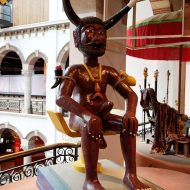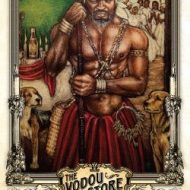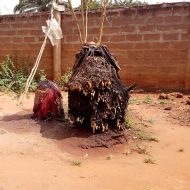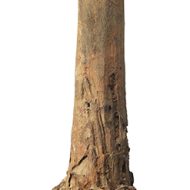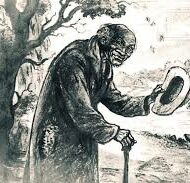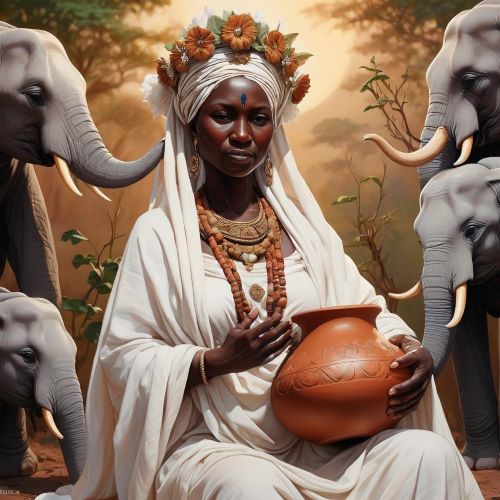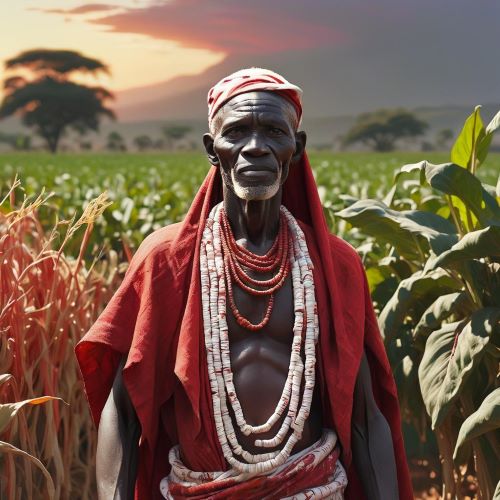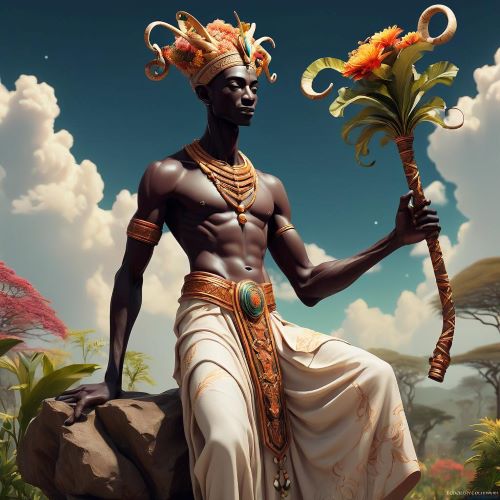Legba : The Trickster God
Listen
At a glance
| Description | |
|---|---|
| Origin | Fon Mythology |
| Classification | Gods |
| Family Members | Mawu (Father), Lisa (Mother), Gu (Brother), Ayaba (Wife) |
| Region | Benin, Togo, Nigeria |
| Associated With | Trickery, Messenger |
Legba
Introduction
Legba holds a prominent place in Fon mythology, esteemed as the guardian bridging the mortal and divine domains. Portrayed often as a trickster, embodying both the chaotic and orderly aspects of existence, he assumes a pivotal role in facilitating communication with the divine. Originating from the Fon people, an ethnic group hailing from Benin and Nigeria, Legba’s character is woven into a captivating narrative, adorned with various traits, family ties, and mystical powers.
Beyond being a deity, to the Fon people of Benin, Legba transcends mere divinity; he is the conduit, the interpreter, and the playful conductor orchestrating the intricate interplay between the tangible and the spiritual realms. Positioned as the custodian of crossroads, Legba not only safeguards these junctures but also swings open doors to opportunity, deftly navigating the intricate paths of destiny with unparalleled skill and a touch of whimsy.
Physical Traits
Legba’s portrayal often captures the essence of an elderly figure, bent over a walking stick that serves as a symbol of wisdom and experience. His association with crossroads, gates, and doors emphasizes his integral role as a mediator and messenger between realms. Despite being depicted with a stature on the shorter side, Legba’s dynamic energy transcends any limitations imposed by size. His visage paints a canvas of mischievous grins and knowing smiles, a reflection of both the wisdom accumulated over ages and the perpetual spark of youth.
Adorned in vibrant attire, Legba’s ensemble tells stories of his extensive journeys and diverse alliances through a mosaic of colorful beads, feathers, and animal skins. The walking stick he carries not only symbolizes his authority but also represents the path he paves between worlds and the erect phallus that he is often depicted with. However, Legba is more than a mere embodiment of flesh and bone; he transcends physical constraints as a shapeshifter. At will, he morphs into various forms—whether animals, objects, or abstract concepts—adding another layer of complexity to the multifaceted nature of this revered deity.
Family
In the intricate tapestry of Fon mythology, Legba finds his place within the intricate family structure of deities collectively known as Vodun. The dynamics among these divine beings are diverse, and while the connections between them can vary, Legba, however, does not confine himself to a singular lineage within the expansive Fon pantheon. Instead, he emerges as a weaver of worlds, intricately connected to a multitude of deities and spirits.
Various traditions present Legba’s familial ties in distinct ways. In some interpretations, he is recognized as the offspring of Mawu, the supreme creator, and Lisa, the divine embodiment of the earth. On the other hand, alternative perspectives depict Legba as the brother of Gu, the blacksmith deity, and the life partner of Ayaba, the revered mother of gods. This diversity in his familial associations showcases the fluidity and adaptability of Legba’s character within the rich narrative tapestry of Fon mythology.
Other names
Legba, revered across diverse cultures, adopts various names as Fon mythology spreads its influence. In Haitian Vodou circles, he takes on the endearing title of Papa Legba, while in the context of New Orleans Voodoo, he is often addressed as Elegba. Affectionately referred to as “Gua,” Legba earns recognition for his pivotal role as the opener of pathways. His mastery of crossroads and divination earns him the revered title of “Atibonou.” The name “Eshu” delves into his trickster aspect, portraying him as the playful disruptor challenging norms and unveiling hidden truths.
Powers and Abilities
In his role as the gatekeeper and messenger, Legba wields a unique ability to traverse seamlessly between the mortal and divine realms. Commencing rituals with his invocation becomes a sacred act, as Legba is entrusted with the task of unlocking the gates to the spirit world. His innate trickster nature adds an element of unpredictability to his influence over outcomes. Legba stands as the consummate linguist, effortlessly navigating the languages spoken by both gods and men. Endowed with the gift of divination, he adeptly reads the patterns manifested in shells, sand, and the very fabric of fate itself.
Legba’s walking stick serves as a conduit for potent magic, wielding the power to open doors to the spirit world and shape the courses of destiny. However, it is his wit that emerges as his most potent weapon. Through playful tricks and sly riddles, Legba’s intention extends beyond mere amusement; it is a deliberate effort to unveil concealed truths and challenge the stagnancy of complacency.
Modern Day Influence
Legba’s cultural influence transcends the confines of traditional Fon mythology, leaving an indelible mark on contemporary society. He occupies a central role in Vodou practices, holding sway in both Haiti and Louisiana. Beyond religious contexts, Legba’s archetype as a trickster and mediator has permeated literature and film, shaping character development in various creative works.
The tendrils of Legba’s influence stretch far beyond the borders of Benin, as he embarked on a transatlantic journey carried by enslaved Fon people who resiliently preserved their traditions in the face of unimaginable brutality. In Brazil, Legba manifests as Exu, the potent trickster deity in Candomblé. Meanwhile, in Haiti, he assumes the revered persona of Papa Legba, the gateway spirit in Vodou. His presence is felt in the adorned doorways and the whispered invocations preceding every ritual.
Even in the realm of popular culture, Legba’s echoes reverberate. His essence is discernible in the blues musician who purportedly sold his soul at the crossroads and in the mischievous Loki of Norse mythology. As Legba traverses geographical, cultural, and artistic boundaries, his enduring influence continues to shape narratives and inspire creative expressions worldwide.
Related Images
Frequently Asked Questions
What is lorem Ipsum?
I am text block. Click edit button to change this text. Lorem ipsum dolor sit amet, consectetur adipiscing elit. Ut elit tellus, luctus nec ullamcorper mattis, pulvinar dapibus leo.
What is lorem Ipsum?
I am text block. Click edit button to change this text. Lorem ipsum dolor sit amet, consectetur adipiscing elit. Ut elit tellus, luctus nec ullamcorper mattis, pulvinar dapibus leo.
What is lorem Ipsum?
I am text block. Click edit button to change this text. Lorem ipsum dolor sit amet, consectetur adipiscing elit. Ut elit tellus, luctus nec ullamcorper mattis, pulvinar dapibus leo.
What is lorem Ipsum?
I am text block. Click edit button to change this text. Lorem ipsum dolor sit amet, consectetur adipiscing elit. Ut elit tellus, luctus nec ullamcorper mattis, pulvinar dapibus leo.
What is lorem Ipsum?
I am text block. Click edit button to change this text. Lorem ipsum dolor sit amet, consectetur adipiscing elit. Ut elit tellus, luctus nec ullamcorper mattis, pulvinar dapibus leo.

